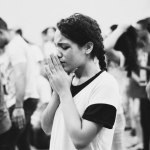Will We Turn Our Backs on Persecuted Christians?
Dear friends,
In a few weeks, on November 2, Christians around the world will mark the International Day of Prayer for the Persecuted Church. It’s a timely reminder that, while most of us who read this email take for granted the religious freedoms guaranteed by the First Amendment of the U.S. Constitution, roughly 380 million of our brothers and sisters around the world live in contexts where they face high levels of persecution or discrimination on account of their faith in Jesus. Thousands were killed for their Christian faith last year, according to Open Doors.
For decades, one of the primary ways that the United States stood with these persecuted believers was by offering them refuge — a safe country where they could live and worship freely, without risk of harm. The U.S. refugee resettlement program is — to quote a letter signed recently by leaders of Christian organizations including the National Association of Evangelicals, Focus on the Family, the Family Research Council, Open Doors US, Global Christian Relief and many others — “One of the most essential tools the United States has historically used to uphold religious freedom.” In fiscal year 2024, more than 29,000 Christian refugees from the 50 countries where Open Doors says that Christians face the most severe persecution were resettled to the U.S.
Since January, however, refugee resettlement has been almost entirely suspended — including for persecuted Christians. While data is not publicly available on the religious demographics of refugees resettled in the federal fiscal year that ended last month, given that almost no refugees of any background have been resettled in the past eight months, the number who fled persecution on account of their Christian faith is also very likely close to zero.
If media reports are accurate — and I hope and pray they’re not — this trend will continue. Multiple outlets have reported that President Trump is considering setting a historically-low refugee ceiling (the maximum number of refugees who could be admitted annually) of 7,500, down from last year’s ceiling of 125,000 and far below the ceiling of 50,000 that President Trump set when he first came into office in 2017. Furthermore, press report that groups who are not persecuted for their faith will be assigned most if not all of these 7,500 slots, leaving persecuted Christians shut out — along with many, many others who have fled persecution for other reasons that qualify an individual as a refugee under U.S. law, such as those persecuted on account of another religious tradition, their race or a political opinion.
Here’s the good news: these are just press reports citing unnamed sources, and sometimes press reports are inaccurate. Or perhaps there are indeed individuals encouraging President Trump, but he may still make a different decision. The annual refugee ceiling has not yet been finalized, and it cannot be finalized under the terms of U.S. law until the administration consults with specific congressional leaders, a process currently delayed by the shutdown of the federal government.
I’d like to ask you to do three things:
- Pray for persecuted Christians around the world — and for those persecuted for other reasons, as well. Pray for God’s protection from harm and for the Church to flourish in spite of persecution. Pray for leaders of countries where Christians are persecuted to cease persecution and to commit their countries to religious freedom. And pray for President Trump and Members of Congress in the United States, that they would reopen the refugee resettlement program for persecuted Christians and others who have fled persecution.
- Advocate — use this easy tool to make a phone call to one of your U.S. Senators and send a message to the White House. It will take no more than a minute or two, and if many Christians speak up, it really could make a difference.
- Spread the word — I’m struck by how regularly I encounter people who love Jesus and care about the persecuted church who have no idea that refugee resettlement has been suspended, or that most refugees who were resettled in 2024 were actually fellow Christians, many of them persecuted on account of their faith. Would you think of a few people in your life who share your Christian convictions to whom you could forward this email and its invitation to pray and advocate? Or you could share this message on social media. And consider inviting your church to set aside a time of focused prayer on November 2, the International Day of Prayer for the Persecuted Church, for the persecuted Christians and those unable to access refuge in the United States.
In Christ,
Matthew Soerens
National Coordinator, Evangelical Immigration Table





